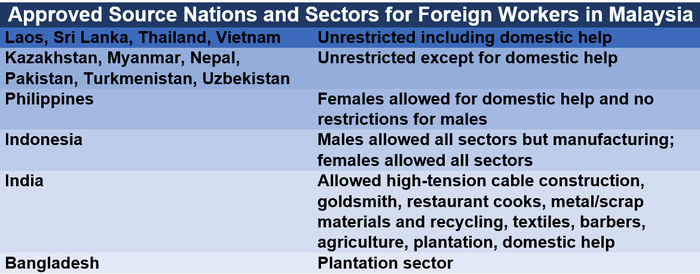Malaysia Depends on Foreign Workers: Asia Sentinel
Malaysia relies on a broad mix of foreign workers. The nation’s median age approaches 30, the fertility rate dips below replacement levels, and foreign workers often do the work that many citizens reject, from cleaning to construction and warehouse work. Unofficial estimates suggest as many as 6 million foreign workers represent more than 18 percent of Malaysia’s population and up to 40 percent of the workforce. About half the foreign workers are undocumented. The permit process is complex, and extra charges imposed by recruiters and placement agencies encourage illegal hiring. Dangerous condidtions compound challenges for workers. “Although foreign workers are legally protected by [the] Employment Act 1955, just like Malaysian workers, no government agencies check their welfare,” reports Murray Hunter for the Asia Sentinel. Legal channels for complaints are lacking. Human rights groups monitor forced labor, and the US recently banned rubber gloves from one company after reports that workers’ passports were confiscated. Hunter suggests that low unemployment among Malaysian youth reduces entrepreneurial drive. “Procurement, contribution to the local economy, exploitation, international reputation, industry productivity and innovation, employment opportunities for locals, and raising wages to more realistic levels need consideration,” he concludes. “For Malaysia to move from the low-wage, low-skill, and low productivity position it currently occupies to a much more competitive economic position depends directly on reforming the foreign labor sector.” – YaleGlobal
Malaysia Depends on Foreign Workers: Asia Sentinel
Malaysia depends on foreign workers for low-skilled tasks, but concern grows about a complex process that encourages a high number of workers who lack permits
Tuesday, December 10, 2019
Read the article from the Asia Sentinel about foreign workers in Malaysia.

(Source: World Bank 2019 report Malaysia - Estimating the Number of Foreign Workers)

(Source: Malaysia Ministry of Human Resources)
Asia Sentinel
Copyright 2017 Asia Sentinel
Comments
What America cannot, or will not do, in America it can do and will do abroad as part of American economic colonialism. Malaysian low cost labor, and lack of environmental and labor standards compared to North American norms, is a result of that colonialism. The USA practically owns Malaysia and anything being said about the Malaysian work force largely reflects onto the American economic colonialist ownership and control over the Malaysian economy. Wikipedia says: "In the modern days, the US is one of the largest foreign investor in Malaysia.[33] The American Malaysian Chamber of Commerce serves as a business association for collaboration between both countries.[34] While figures capturing the full range of foreign investment (including oil and gas) are not available, American companies are particularly active in the energy, electronics, and manufacturing sectors and employ nearly 200,000 Malaysian workers.[35] The cumulative value of US private investment in the manufacturing sector in Malaysia is roughly $15 billion.[33][36] In the 1970s, American companies, including Agilent AMD, Fairchild Semiconductor, Freescale Semiconductor, Intel, Texas Instruments and Western Digital pioneered the Malaysian electrical and electronics (E&E) sector, which exports billions of dollars of equipment to global supply chains every year. Major US oil and gas companies, including ExxonMobil, ConocoPhillips, Hess and Murphy Oil, have invested billions of dollars to develop Malaysia’s energy resources. Many US-based fast-food/coffeehouse chains such as A&W Restaurants, Burger King, Domino's Pizza, Dunkin' Donuts, KFC, McDonald's, Pizza Hut, Starbucks, Subway, Texas Chicken and Wendy's had already dominating the Malaysian fast food/coffeehouse markets.[37][38] Recent US investors include Hershey, Kellogg's, Bose and Golden Gate Capital. The US is Malaysia's fourth largest trading partner and Malaysia is the 22nd largest trading partner of the US Annual two-way trade in goods and services in 2013 amounted to approximately $44 billion.[39]"